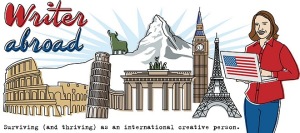Recently LocationIndependentProfessionals.com asked why we want to be location independent. “Whatever you’re looking for you can find where you are.” It’s simply not true.
We can get what we want and need where we are — but not with a local solution. Try a psychic one.
 Take this week’s short and balmy trip to Manhattan. I acted as a technology mule, bringing iPads to poor, under-served early adopters here in Istanbul, and reconnected with friends doing work I admire on scales and with methods I aspire to. My peers.
Take this week’s short and balmy trip to Manhattan. I acted as a technology mule, bringing iPads to poor, under-served early adopters here in Istanbul, and reconnected with friends doing work I admire on scales and with methods I aspire to. My peers.
- Popped in for dinner at Babbo, one of America’s best restaurants, where a pal worked his way up to general manager.
- Barbecued (veggie burgers, of course) with a television personality looking to demystify America’s health through an East-West approach, and a longtime colleague whose fifth appearance on the New York Times bestseller list comes with her solo effort on the importance of strong relationships.
- Cocktailed with a fellow Berkeleyan and writing buddy who just sold her haunted-by-a-Beat-writer THE GHOST OF GREENWICH VILLAGE.
- Strolled the hipster hoods of Brooklyn with international designers energized by new iPhone and iPad apps.
- Lunched with a former roomie now French radio producer at the United Nations who’s branching into multimedia, like her video with my favorite Beninese singer and human rights activist Angelique Kidjo to demand rape be prosecuted as a war crime.
Right up my alley. But I may never live there again. Most of us cannot (always) go somewhere on the ground where all our people and our perfect lifestyle exist. We must find that psychically — our “global niche“.
The meaning and purpose of location independence and digital nomadism is to live and work autonomously. Although it evokes mobility, it’s especially crucial for long term living situations: to find a way to get what you want and need despite the limitations of your location. Much like the cross-national quandary posed at expat+HAREM — “are you a global citizen by choice, or necessity?” — out of necessity to live and work to my abilities I aim to be independent of my specific location.
Are you location independent by choice, or necessity? Where and why?
This blog has moved. Comment here.


 2010 Capital of Culture monthly feature of best Istanbul links
2010 Capital of Culture monthly feature of best Istanbul links